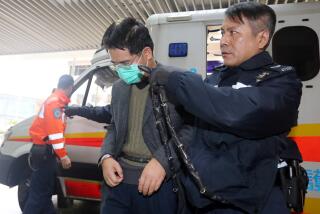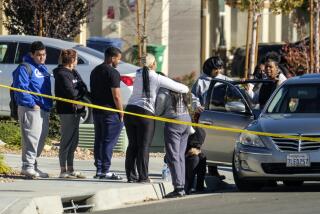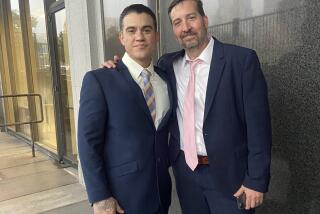Man convicted in 1991 Phoenix-area Buddhist temple massacre
A jury in Phoenix on Thursday convicted a man charged in the 1991 killings of nine people, including six Buddhist monks, bringing an end to a bizarre decades-long case that involved multiple trials and evidence of overzealous police interview tactics.
Johnathan A. Doody sat impassively in Maricopa County Superior Court as a clerk read guilty verdicts in a robbery gone bad nearly a quarter-century ago: nine counts of first-degree murder, nine counts of armed robbery and single counts of burglary and conspiracy to commit armed robbery.
Now 39, Doody was just 17 on Aug. 10, 1991, when shortly after midnight he ordered six Buddhist monks, two young initiates and an elderly nun to kneel on the floor of the Phoenix-area Wat Promkunaram temple. One by one, he shot them in the head and torso during a heist that netted $2,600 and some cameras. All the victims were Thai or of Thai descent, as is Doody.
Authorities garnered confessions in the case from six men, including Doody. Four were later cleared and three of those successfully sued Maricopa County. The police tactics were at the heart of Doody’s repeat trials.
Legal experts said Thursday that the case represented the perils of police departments using aggressive tactics to get confessions.
“This case is about the failure of the criminal justice system to come to grips with the reality of both coerced and false confessions,” said Steven Drizin, a Northwestern University Law School professor and legal director of the Center on Wrongful Convictions. “This particular police department not only got false confessions from four innocent men, they got Mr. Doody’s using inappropriate tactics.”
In 1991, working the high-profile case, Maricopa County sheriff’s deputies quickly arrested four Tucson men — who came to be known as the Tucson Four — in addition to Doody’s best friend, Alessandro “Alex” Garcia.
After many hours of being separately interrogated, Doody and Garcia confessed. Garcia said he had committed the killings with the Tucson Four. But the Tucson men were cleared in the case, and three won lawsuits against Maricopa County.
Doody was found guilty in 1993 and sentenced to 281 years in prison. But in 2011 an appeals court rejected his conviction after ruling that investigators improperly obtained his confession. The appeals court ruled that Maricopa County deputies distorted their reading of Doody’s Miranda rights, telling him he was entitled to an attorney only if he had committed a crime.
Doody was tried a second time in August, but in October, a hung jury resulted in a mistrial. The third trial began in December. Doody’s confession was declared invalid, and in both cases the evidence hinged on Garcia’s testimony.
On Thursday, the jury returned its verdict after five days of deliberations. Doody has maintained his innocence.
“What’s stunning is that state court judges often bless the kinds of tactics used here,” Drizin said. “It took the federal courts to finally provide a remedy for Mr. Doody.”
Garcia, who pleaded guilty and testified against Doody, said the pair donned their high school ROTC uniforms and boots they figured would disguise footprints. With a 20-gauge shotgun and a borrowed .22-caliber rifle, Garcia said they ransacked the temple while holding the group at gunpoint.
Garcia testified that Doody shot them all in the head with the .22, and that he himself discharged four shotgun rounds into the bodies.
Dan Simon, a professor of law and psychology at USC, said confessions were not foolproof evidence in trials. “We just can’t be sure that just because someone confessed, they actually committed the crime,” he said.
One puzzle, he added, is why people confess to crimes under interrogation in the first place.
“Most people have a strong intuition that no innocent person would ever confess to a crime,” Simon said. “But we know that people confess primarily because of psychological pressure brought on during interrogations. And we just can’t be confident that it’s only the guilty who succumb and break down.”
More to Read
Start your day right
Sign up for Essential California for news, features and recommendations from the L.A. Times and beyond in your inbox six days a week.
You may occasionally receive promotional content from the Los Angeles Times.







